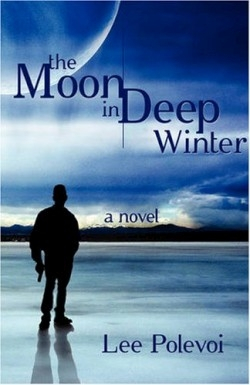The Moon in Deep Winter
Anyone suffering from even mild depression would be wise to set this book aside and not pick it up again until the sun shines brightly or the liquor kicks in. The setting, the characters, the plot are all awash in gloom. Still, the story is irresistible. The time is 1981. After five years of ne’er-do-well ram-bling, Parker Sloane returns on a surprise visit to his home in rural Massachusetts, just as winter is about to descend. There he is greeted (with varying degrees of hostility and suspicion) by his harried mother; his overbearing stepfather, Burke Sullivan; a sullen younger stepbrother, Walt, who’s building an airplane engine in his room and fantasizing about escaping to Easter Island; a beautiful stepsister, Rita, for whom Parker feels an immediate sexual attraction; and Burke’s ancient and deranged mother, Eugenia. The family is a minefield.
Although there is a suspenseful build-up to the inevitable emotional explosion, this book is not a mystery in the classic sense. There’s no big secret waiting to be revealed that clarifies and unifies this maze of dysfunctions. Rather, the mystery lies in how each of the characters will unravel under the enor-mous pressure of simply being around each other. Rita, who wants to be a dancer, is the sanest of the lot, the one least haunted by memories, misdeeds, ambitions, or despair. Parker, through whose eyes the story develops, longs to know more about his real father, who, according to his mother, drowned in a motel swimming pool. Walt alternately withers and rages under his own father’s unconcealed disdain for him.
Adding tinder to the mix is Dr. Leo Trunk, who identifies himself as a professor of paleoanthropology on sabbatical from Harvard. He, too, casts a car-nal eye on Rita and dazzles the stolid Walt by attempting to teach him to fly. Deputy Sheriff Alf Cooper appears to have something going with Parker’s mother. Convoluted though this may sound, the author keeps his narrative threads straight and sculpts his characters with exquisite pre-cision, never allowing their intrinsic strangeness to become distractingly grotesque.
Polevoi is also a master of scene setting. That quality is evidenced here as he describes a nocturnal ice-fishing outing on which Parker and Walt con-front the wily and paranoid Burke, who’s just told them a World War II story about parachuting at night behind enemy lines: “A hush over-took Ghost Lake. Looking up, Parker imagined wave upon wave of fledgling spies falling from the sky. He noticed Burke fumbling inside his flight jacket as if scratching an obscure itch, and thought: I can’t take much more of this. But when the old man squirmed free of the jacket and he saw what he was holding—the revolver from the desk drawer with an eagle on the ivory grip—he felt not alarmed so much as simply in thrall to the rush of oncoming events.” That’s pretty much the way the reader will react.
Reviewed by
Edward Morris
Disclosure: This article is not an endorsement, but a review. The publisher of this book provided free copies of the book to have their book reviewed by a professional reviewer. No fee was paid by the publisher for this review. Foreword Reviews only recommends books that we love. Foreword Magazine, Inc. is disclosing this in accordance with the Federal Trade Commission’s 16 CFR, Part 255.

